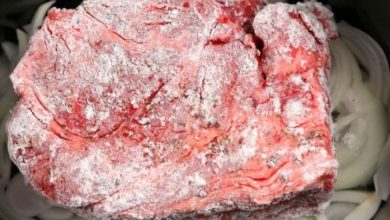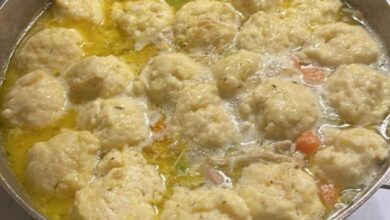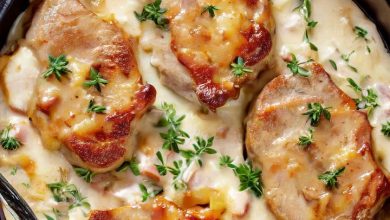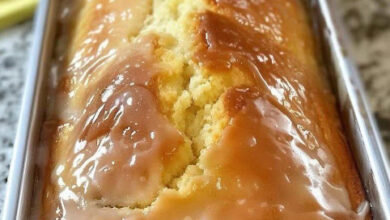Doctor Explains Why You Should ‘Never’ Wash Your Chicken Before Cooking It
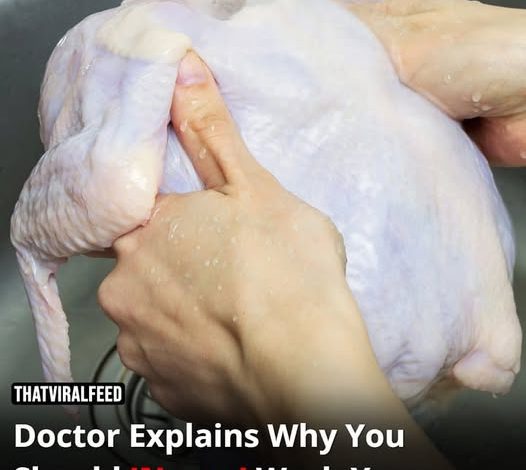
Many people believe that washing raw chicken before cooking makes it cleaner and safer. However, doctors and food safety experts strongly advise against it because it can actually increase your risk of food poisoning. Here’s why:
ADVERTISEMENT
Washing Chicken Spreads Bacteria Everywhere 🦠
Raw chicken is often contaminated with harmful bacteria, such as:
ADVERTISEMENT
- Salmonella – Causes severe food poisoning.
- Campylobacter – The most common bacterial cause of diarrhea.
- E. coli – Can lead to serious infections.
How Washing Chicken Makes It Worse:
- When you rinse raw chicken under the sink, water splashes everywhere—on your hands, sink, countertops, utensils, and even your clothes.
- Studies show that water droplets can travel up to 3 feet (about 1 meter) from where the chicken is washed.
- These bacteria can survive for hours on kitchen surfaces, increasing the risk of cross-contamination.
✅ What You Should Do Instead:
ADVERTISEMENT
- Do NOT rinse raw chicken. The heat from cooking is enough to kill bacteria.
- If you’re worried about slime or residue, pat the chicken dry with paper towels and wash your hands immediately.
Cooking Kills Bacteria – Washing Does Not 🔥
Many people think washing chicken removes bacteria, but water alone cannot kill harmful bacteria.
Why Cooking Is the Only Safe Way to Kill Bacteria:
- Bacteria on raw chicken die at high temperatures.
- The USDA recommends cooking chicken to an internal temperature of 165°F (75°C) to ensure it is safe to eat.
✅ What You Should Do Instead:
- Use a meat thermometer to check that the chicken reaches 165°F (75°C) internally.
- Cook chicken thoroughly, making sure no pink meat remains.
Increased Risk of Food Poisoning 🤢
When bacteria spread in your kitchen, they can contaminate:
- Fresh fruits and vegetables
- Cutting boards, knives, and other cooking utensils
- Hands and surfaces that touch other foods
What Happens If You Get Infected?
- Salmonella infection causes diarrhea, vomiting, fever, and stomach cramps.
- Campylobacter infection can lead to severe dehydration and long-term complications like arthritis.
- Young children, pregnant women, elderly individuals, and people with weak immune systems are at the highest risk of severe illness.
✅ How to Prevent Food Poisoning:
- Keep raw chicken separate from other foods.
- Wash your hands and surfaces thoroughly after handling raw chicken.
- Use a separate cutting board for raw meat to avoid cross-contamination.
Washing Chicken Can Cause Hard-to-Clean Contamination 🚰
Even if you clean your sink and countertops after washing raw chicken, bacteria can still survive in tiny water droplets and kitchen crevices.
- Bacteria can get trapped in sink drains, sponges, dishcloths, and even small scratches on cutting boards.
- A study by the UK Food Standards Agency found that 60% of kitchen sinks still had bacteria after being cleaned.
- Using a sponge to wipe contaminated areas spreads bacteria even more.
✅ What You Should Do Instead:
- Sanitize sinks and surfaces properly with hot, soapy water and disinfectant.
- Use disposable paper towels instead of sponges to clean kitchen surfaces.
- Avoid using the same towel for hands and dishes after handling raw chicken.
Washing Chicken is an Old Myth That Needs to Stop 🚫
Many people wash chicken because:
- They were taught to do so by family members.
- They think it removes bacteria.
- They believe it makes chicken taste better.
The Truth:
- Washing chicken does not improve taste or texture.
- Modern poultry processing removes most visible dirt, feathers, or blood, so washing is unnecessary.
- Cooking at the proper temperature is the only way to ensure food safety.
✅ Expert Recommendation:
- Health organizations worldwide (USDA, CDC, FDA, and WHO) all advise against washing raw chicken.
- Trust scientific evidence over outdated cooking myths.
Final Verdict: NEVER Wash Your Chicken Before Cooking It! 🚨
🔴 Why?
- It spreads harmful bacteria to your kitchen, utensils, and other foods.
- Washing does NOT kill bacteria—only proper cooking does.
- It increases your risk of food poisoning from Salmonella and Campylobacter.
- Bacteria can survive in sinks and contaminate everything nearby.
✅ What You Should Do Instead:
- Handle raw chicken carefully – Keep it away from fresh foods.
- Cook chicken to 165°F (75°C) – This is the only way to kill bacteria.
- Sanitize your kitchen properly – Use disinfectants, not just water.
- Follow food safety guidelines – Trust science, not old myths!
So next time you’re in the kitchen, skip the rinse and go straight to cooking—your health will thank you! 🥩🔥
